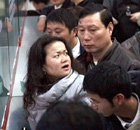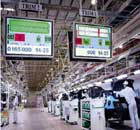Comment
Water price hikes can be more transparent
(China Daily)
Updated: 2009-12-18 09:18
 |
Large Medium Small |
Beijing made progress in transparency when it held a special hearing on water price on Wednesday, but there was still room for improvement.
It's understandable that the cost of water in Beijing should be higher than the average Chinese city. But the prices cannot be raised at will. People may wonder how the rise of 0.48 yuan per cubic meter was calculated. The public should be informed about the price structure.
At the hearing, officials said the cost of sewage treatment rose to 1.716 yuan per cubic meter in 2008, from 1.514 yuan in 2007 and 1.375 yuan in 2006. But they failed to explain how they came to the numbers and how much profits the water treatment plants had made.
When determining water prices, transparency of costs is more important than that of procedures. Without transparency of costs, people will consider the price hikes - whether they are a single or three-year hike - as a conspiracy among interest groups. It would be difficult for people to accept such price rises.
At the hearing, there was consensus among the participants that water waste is serious in the city. Then may we ask: is price hike the only way to curb water waste? As the participants said at the hearing, differential water pricing is a wise move to promote the conservation of water resources. Besides, there are many other measures available for water saving.
It has been reported that the "purified water machines" in many communities are astonishingly wasteful. They sell 1 ton of treated water at the expense of 3 tons of wasted water. Altogether they waste millions of tons of water every year.
People may also ask, why people don't feel safe when they drink tap water? Will higher water prices bring better water quality?
In addition, the government has been promoting water saving with the establishment of a special fund. But other than putting up slogans and banners, what work have they done to educate people on water saving?
(Excerpts of an editorial that appeared in Beijing News on Dec 17)














